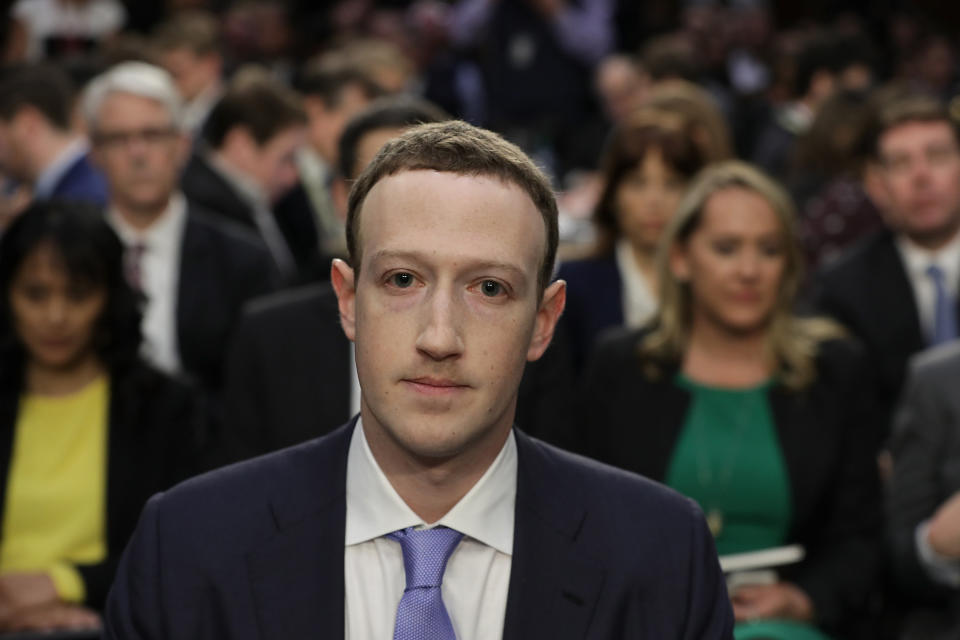Mark Zuckerberg's Senate Testimony Predictably Led To Memes Galore
Memes ran amok on social media as Facebook founder Mark Zuckerberg spoke in front of the Senate Judiciary and Commerce committees on Tuesday to talk about Cambridge Analytica and security on the social network.
As Sens. Bill Nelson (D-Fla.), John Thune (R-S.D.), Chuck Grassley (R-Iowa) and Dianne Feinstein (D-Calif.) all gave opening statements, Zuckerberg sat quietly with a particularly powerful resting, uh, face.

“My top priority has always been our social mission of connecting people, building community and bringing the world closer together. Advertisers and developers will never take priority over that as long as I’m running Facebook,” Zuckerberg said in his opening statement.
“I started Facebook when I was in college. We’ve come a long way since then,” he said. “I realize the issues we’re talking about today aren’t just issues for Facebook and our community — they’re challenges for all of us as Americans.”
As the floor opened up to the 42 senators poised to ask him questions, the memes rolled in. Here are some of our favorites:
*record scratch*
*freeze frame*
Yup, that's me. You're probably wondering how I ended up in this situation. pic.twitter.com/AyJ6GeadU9— Joshua Topolsky (@joshuatopolsky) April 10, 2018
The only opening line I want to hear from Zuck pic.twitter.com/g3phCPA3HT
— David Pierce (@pierce) April 10, 2018
THE SHAPE OF WATER (2017) pic.twitter.com/cic30oTzCI
— Chris Taylor (@FutureBoy) April 10, 2018
mark zuckerberg's senate testimony will now have stories pic.twitter.com/XKnUxxD3xl
— julia reinstein (@juliareinstein) April 10, 2018
Live shot from C-SPAN 8: The Ocho pic.twitter.com/0OZZNZ2xdB
— Jake Tapper (@jaketapper) April 10, 2018
anyway, here's zuckerberg's arrival set to the radiohead cover from "the social network" trailer pic.twitter.com/wsuA8GaVFY
— David Mack (@davidmackau) April 10, 2018
When you know that you have enough information to destroy everyone questioning you pic.twitter.com/XqHk4Re0yI
— Ben McDonald (@Bmac0507) April 10, 2018
keepittogetherkeepittogetherkeepittogetherkeepittogetherkeepittogether pic.twitter.com/j2xT6065sF
— Simon Maloy (@SimonMaloy) April 10, 2018
When you're trying really hard to look like a real person and not a robot. pic.twitter.com/x5NVmg6NUI
— Aly Ellis (@alykeves) April 10, 2018
Marvel: Infinity War is the most ambitious crossover event in history.
Me: pic.twitter.com/zXrkr79dJF— OhNoSheTwitnt (@OhNoSheTwitnt) April 10, 2018
you vs the guy she told u not to worry bout pic.twitter.com/bvTSRxKtvo
— Gabriela Barkho (@gabrielabarkho) April 10, 2018
In response to multiple questions, Mr. Zuckerberg repeated the phrase “two weeks” before detaching his head and throwing it into the gallery. pic.twitter.com/99qONEqbL8
— Dave Itzkoff (@ditzkoff) April 10, 2018
・ 。
😏∴。 *
・゚*。PRIVACY・
・ *゚。 *
・ ゚*。・゚😏。
😏・。°*. ゚
* ゚。·*・。 ゚*
゚ *.。😏。YOUR DATA・
* 😏。・゚*.。
* LOL ゚・。 * 。
・ ゚😏 。 pic.twitter.com/MYcrZurgIi— Kat Lap (@Its_Katka) April 10, 2018
the only white guy we can trust pic.twitter.com/TSoSl70Aog
— Ziwe (@ziwe) April 10, 2018
"is that guy behind me wearing the same tie as me what the fuck" pic.twitter.com/Pb7lUuhLG1
— darth™ (@darth) April 10, 2018
live look at zuck on capitol hill pic.twitter.com/8z9GJ4EYeQ
— it me jeff meltz (@thecultureofme) April 10, 2018
when you post on here that brooklyn bbq is the best in the country pic.twitter.com/hfRTDrqOaX
— Gideon Resnick (@GideonResnick) April 10, 2018
1 RT = 1 stealing this nerds lunch money pic.twitter.com/ZSDvhfsZ2o
— Dana Schwartz (@DanaSchwartzzz) April 10, 2018
When you wake up from a quick, 20 minute nap 4 hours later pic.twitter.com/168ZPZbMjD
— Caleb Hull (@CalebJHull) April 10, 2018
i enjoying mysekf at the senate hearing, but then i remembered instances of regret in my life, and pain i have caused others pic.twitter.com/AdbevclhKQ
— Gabriella Paiella (@GMPaiella) April 10, 2018
do not ask me to explain this pic.twitter.com/qchoVRhFoS
— brian feldman (@bafeldman) April 10, 2018
Uh ... good luck out there, Zuck.
Also on HuffPost
Love HuffPost? Become a founding member of HuffPost Plus today.
It Can Mess With Your Sleep

The result is an exhausting feedback loop that could leave you fried.
It Can Make You Depressed

“We found that if Facebook users experience envy of the activities and lifestyles of their friends on Facebook, they are much more likely to report feelings of depression,” study co-author Dr. Margaret Duffy, a University of Missouri journalism professor, said in a press release.
But, simply being aware that people are presenting their best selves -- and not necessarily their real selves -- on social media could help you feel less envious.
It Can Drain Your Smartphone Battery

Here's how to do it.
It Can Sap Your Focus

It Can Ruin Your Relationship

It Can Make You Socially Awkward

What's more, most of your Facebook friends don't really care that much about you.
It Can Be A Huge Waste Of Time

“It appears that, compared to browsing the Internet, Facebook is judged as less meaningful, less useful, and more of a waste of time, which then leads to a decrease in mood,” Christina Sagioglou and Tobias Greitemeyer, behavioral scientists at the University of Innsbruck in Austria, wrote in a paper published in 2014.
Facebook doesn't always make us feel crummy. But, if it does, it's time to do something else.
It Can Create An Echo Chamber

But Facebook disagrees, saying last year that it was not responsible for creating echo chambers. Either way, Facebook still plays a big role in how people consume information online.
It Tracks (And Shapes) Your Behavior

Eventually, it may get better at understanding people's preferences -- so much better that some experts fear how precisely future marketing and political campaigns will be able to target people. We might even come to "question whether we still have free will," Illah Nourbakhsh, a robotics expert at Carnegie Mellon University, told HuffPost in an interview.
It Knows When You Go To Bed At Night

Though Facebook asked him to take down this tool, the stunt pointed to a larger issue of data privacy: We all reveal a huge amount of personal information online, and we can't always control how others use it.
This article originally appeared on HuffPost.

